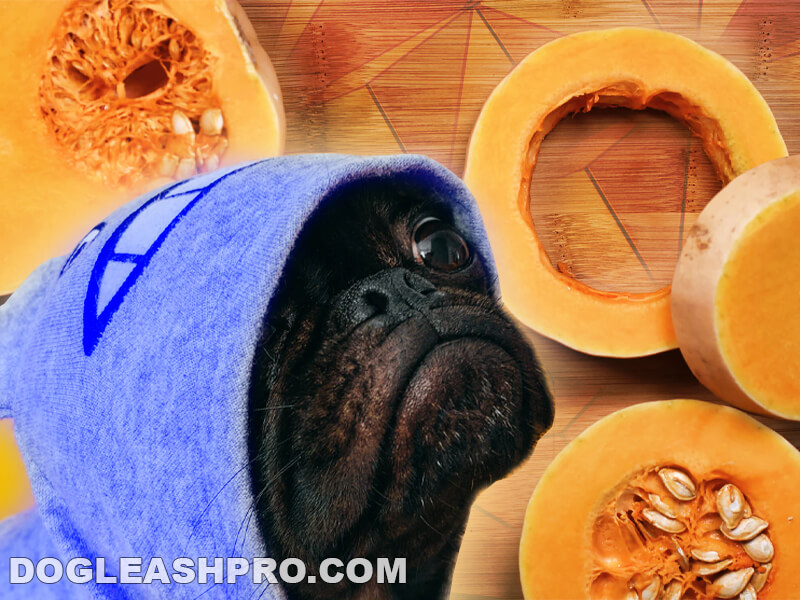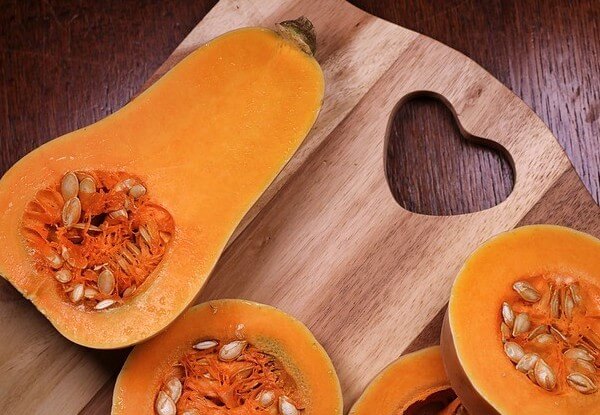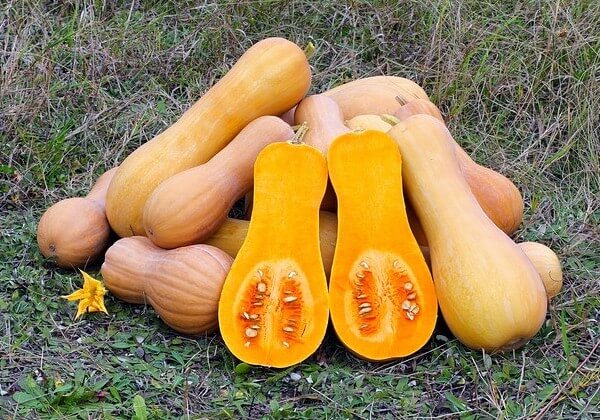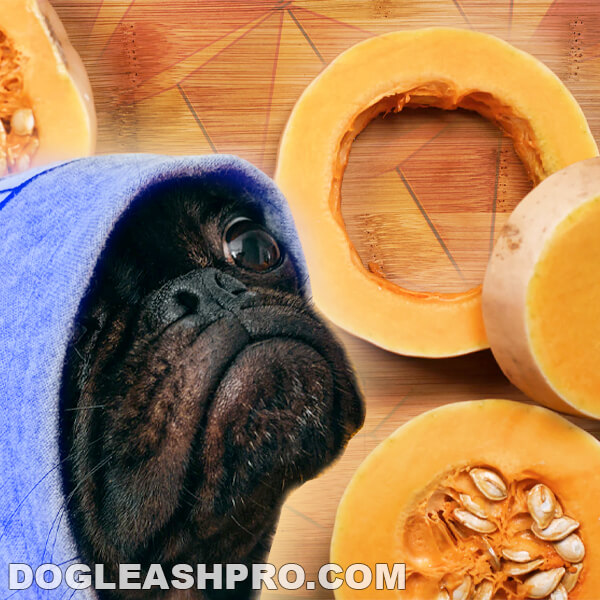
I was looking for a naturally sweet treat that is also nutritious and healthy for my canine friends and decided on Butternut Squash. But is Butternut Squash safe for doggy consumption? Let’s find out!
Can dogs eat Butternut Squash? Yes, dogs can eat Butternut Squash in moderation as it is packed full of nutrients such as vitamins, minerals, and fiber. However, be sure it is fully cooked with no added seasonings like salt or sugar. Since it is a starchy fruit, moderation is key.
Table of Contents
Can dogs have Butternut Squash?

Yes, dogs can have Butternut Squash. Can I give my dog Butternut Squash? Absolutely, you can give your dog Butternut Squash. Before feeding your dogs this starchy vegetable or fruit, proper preparation is a must. This will ensure that your canine friends can fully enjoy this wonderful fruit.
Let’s dive into all the health benefits that Butternut Squash can provide to our furry friends.
Is Butternut Squash good for dogs?

Yes, Butternut Squash is good for dogs. Is Butternut Squash good for dogs to eat? Yes, Butternut Squash is good for dogs to eat, provided that it is fully cooked, plain without any seasonings like salt, sugar, or fats, and both the skin and seeds are removed.
Plain and fully cooked Butternut Squash provides tons of nutritional value to our four-legged friends. It is low in both calories and fats, which makes them an excellent healthy treat for dogs. When our four-legged friends eat Butternut Squash, they will receive the following health benefits.
- Vitamin A.
- Vitamin B6.
- Vitamin C.
- Antioxidants.
- Beta-carotene.
- Fiber.
- Folate.
- Potassium.
Beta-carotene can combat cancer and various diseases in dogs
Let’s start with the bright orange color of the flesh. The bright orange flesh means that this fruit contains beta-carotene which can help ward off a wide variety of diseases as well as cancers in dogs such as hip dysplasia and heart disease.
Beta-carotene is a very powerful immune modulator and antioxidant. Because beta-carotene is an antioxidant and an immune modulator, it can help with humoral immune responses.
This means that it can increase the plasma antibody concentration to help delay hypersensitivity-type responses in dogs.
As you can see, beta-carotene increases the antibody levels in the dog’s blood. Also, it helps the dog’s immune system recognize vaccines easily.
When dogs eat food that contains beta-carotene such as Butternut Squash, they will also receive provitamin A from it. That’s because the beta-carotene gets absorbed into their intestine and makes its way to the dog’s liver. When beta-carotene is combined with fats in your dog’s diet, it starts to convert to vitamin A. Let’s talk about how vitamin A can help your four-legged friends.
Vitamin A improves a dog’s eyesight
When vitamin A is released into your dog’s bloodstream, it usually travels to the retina of the dog’s eyes. The cells in the retina use vitamin A to inform the brain what your dog is seeing.
The combination of beta-carotene and vitamin A provides your furry friend with healthy hair and skin as well as prevents cancer, maintains good eye health, reproductive health, and normal bone development.
Fun Fact: Brussel Sprouts also contains vitamin A as well as a host of other vitamins and minerals. But do dogs enjoy this vegetable? Check out Can Dogs Eat Brussel Sprouts to find out!
Folate and fiber improves a dog’s heart function
Both folate and fiber can improve and regulate your dog’s heart function so eating Butternut Squash helps to promote a healthy heart in dogs.
The fiber in Butternut Squash also helps regulate the dog’s digestive system and aid in bowel regularity which keeps the gut healthy and in balance. So if your pooch has constipation issues or has diarrhea, adding a little bit of Butternut Squash to their meal may help.
The good bacteria in your dog’s intestine ferment the fiber into fatty acids and this fatty acid is what helps the colon healthy as well as prevent bad bacteria overgrowth.
You may be interested in: Can Dogs Eat Edamame?
Potassium promotes healthy and strong bones in dogs
You can find high amounts of potassium in Butternut Squash, which makes this fruit great for older or senior dogs. Potassium helps promote and maintain strong and healthy bones in dogs.
Vitamin B6 helps with your dog’s nervous system
Butternut Squash is also packed full of vitamin B6. Vitamin B6 not only helps your dog’s nervous system, but it’s an essential vitamin that is responsible for the following:
- Red blood cell function.
- Glucose generation.
- Nervous system function.
- Immune response.
- Regulates hormones.
- Gene activation.
- Niacin synthesis.
Fun Fact: Fish is a food that is high in vitamin B6. While dogs can eat fish, can they eat fish heads? Check out Can Dogs Eat Fish Heads? to find out!
Vitamin C is a powerful antioxidant for dogs
Butternut Squash contains vitamin C that can help your furry friends stay healthy. That’s because vitamin C can ward off sickness. If your pooch has anxiety or is often stressed, feeding them a little bit of Butternut Squash can help keep him or her calm.
Vitamin C is also an antioxidant so it can combat free radicals (which cause aging in dogs) to prevent cell structure damage in dogs. Free radicals can also alter the DNA codes. As you can see, vitamin C is an essential antioxidant for dogs.
Fun Fact: Did you know that Bitter Melon is also packed full of vitamin C? Check out Can Dogs Eat Bitter Melon? to find out if your dogs can eat this bitter fruit.
Is Butternut Squash ok for dogs?
Yes, Butternut Squash is ok for dogs in moderation. Is Butternut Squash safe for dogs? Yes, Butternut Squash is safe for dogs if it is in moderation and it is just the flesh. In fact, your furry friends will receive tons of health benefits from eating this fruit since Butternut Squash is chocked full of minerals, vitamins, fiber, and antioxidants.
However, it’s important to keep in mind that dog owners should feed their pooch a moderate amount of Butternut Squash. Since this fruit is starchy, it is not safe for dogs that are overweight or obese.
Many vets recommend that overweight or obese dogs stay away from starchy food as eating it can contribute to their weight gain.
On the other hand, if your pooch is underweight and needs help with weight gain, then adding a little bit of Butternut Squash to their meal can be helpful and healthy.
Be sure your pup is getting his daily exercise after eating starchy fruit like Butternut Squash.
Handy Hint: It’s best for dogs to avoid eating starchy food, especially if they are on weight management. Lasagna is a favorite food for lunch and dinner, but Can Dogs Eat Lasagna?
Can dogs have Butternut Squash soup?
Yes, dogs can have Butternut Squash soup as long as there are no toxic ingredients in the soup such as onions or garlic. The soup should be plain with no added salt or sugar or any other seasonings. If the soup is just Butternut Squash and water, then it should be fine for dogs. If not, please do not feed the Butternut Squash soup to your pooch.
Can dogs eat raw Butternut Squash?
If you’re wondering, can my dog eat raw Butternut Squash, the answer is simply no, dogs should not eat raw Butternut Squash. Although raw Butternut Squash is not toxic or poisonous to dogs, it is harmful to dogs in several ways.
Raw Butternut Squash puts unnecessary pressure on your dog’s teeth
Avoid feeding your K9 friends raw Butternut Squash. Similar to how humans would not eat Butternut Squash raw, your furry pooch should not eat raw Butternut Squash either.
That’s because raw Butternut Squash is pretty hard so it may be hard on your dog’s teeth. Although we do know our dogs’ jaws are pretty powerful and they may most likely chomp on that raw Butternut Squash.
Raw Butternut Squash can become a choking hazard in dogs
If that is the case, some pieces of raw Butternut Squash may become a choking hazard. One or two raw and hard Butternut Squash pieces may get stuck in your dog’s throat or esophagus and prevent them from breathing properly.
Raw Butternut Squash can cause intestinal blockage in dogs
If your dog does manage to swallow a few raw Butternut Squash pieces, these pieces may get lodge in your dog’s intestine causing an intestinal blockage or a bowel obstruction.
If you suspect your pup may have a bowel obstruction or intestinal blockage, contact your vet immediately. This requires immediate medical attention. In severe cases, this may require surgery.
Difficult for the dog’s digestive system
Not only that, raw Butternut Squash is hard so it is difficult for your dog’s digestive system. It will most likely not be able to digest properly.
So, is raw Butternut Squash safe for dogs?
As you can see, raw Butternut Squash is not safe for dogs. Can dogs eat Butternut Squash raw? No, avoid feeding your pups raw Butternut Squash. If you’re ever wondering, is raw Butternut Squash ok for dogs? The simple answer is no, because raw Butternut Squash is fibrous, which makes it difficult for dogs to chew it and digest it.
All of the reasons above are why raw Butternut Squash for dogs is a no-no.
Can dogs eat Butternut Squash skin?
No, dogs should not eat Butternut Squash skin. The skin is not safe for dogs to eat and can become a choking hazard. Not only that, it is difficult for the dog’s body to digest the Butternut Squash skin. For this reason, peel off the skin first before feeding it to your four-legged friends.
Can dogs eat cooked Butternut Squash?
Yes, dogs can eat cooked Butternut Squash. In fact, we highly recommend that dog owners cook the Butternut Squash first before feeding it to their canine friends. Cooked Butternut Squash is the best way for our dogs to enjoy it and receive the health benefits from it.
Be sure to feed your pooch Butternut Squash in moderation because it is starchy so it is high in carbohydrates which can lead to weight gain.
Let’s discuss how to properly prepare and cook the Butternut Squash for our K9 pals.
How to cook Butternut Squash for dogs?
Proper preparation and cooking of the Butternut Squash fully are crucial before your pups can truly enjoy this sweet and delicious fruit.
Be sure to remove the skin of the Butternut Squash first. After you cut into it, remove all the seeds. These seeds are harmful to dogs.
You can then cook the Butternut Squash however way you want. Some choose to boil or steam it, while others choose to steam it. The cooked Butternut Squash should be plain without any added seasonings like salt, sugar, or fats.
However, if you want to saute the Butternut Squash, you can add a little bit of dog-friendly oils like olive oil or natural coconut oil.
You can either cut the Butternut Squash into smaller pieces before or after it is cooked.
Can dogs eat frozen Butternut Squash?
No, dogs should not eat frozen Butternut Squash. Only feed your pooch fresh Butternut Squash. If it is frozen or canned, avoid feeding it to your pup.
So, can dogs eat Butternut Squash?
Dog owners can absolutely feed their furry friends Butternut Squash in moderation. This sweet nutritious fruit makes for a great dog treat or addition to a dog’s meal. However, moderation is key because it is starchy and full of carbs which can lead to weight gain and obesity.
If your pooch has never had Butternut Squash before, be sure to introduce this new food to him slowly and in small amounts. After, it’s crucial that you monitor him closely for any reactions. If you notice any allergic reactions such as itchy skin, runny nose, watery eyes, vomiting, having diarrhea, or sneezing, avoid giving him any more Butternut Squash and contact your vet as soon as you can.
DISCLAIMER: THIS WEBSITE DOES NOT PROVIDE MEDICAL ADVICE
The information, including but not limited to, text, graphics, images and other material contained on this website are for informational purposes only. No material on this site is intended to be a substitute for professional veterinary advice, diagnosis, or treatment. Always seek the advice of your veterinarian or other qualified health care provider with any questions you may have regarding dietary needs.
Resources:
https://en.wikipedia.org/wiki/Butternut_squash
https://www.nap.edu/resource/10668/dog_nutrition_final_fix.pdf

With over five years of specialized experience as an animal writer, my expertise lies in dog nutrition, health, behavior, grooming, and training. I am dedicated to delivering helpful and informative content that caters to the well-being of our furry friends. My primary goal is to empower pet owners with knowledge and ensure our canine companions thrive in health and happiness. In my free time, I love volunteering at local dog rescue centers.







